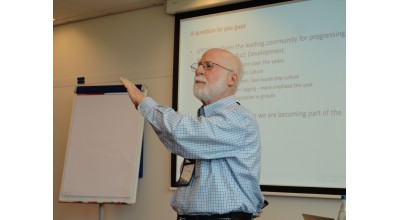Michael Kennedy, one of the most well-known names in Lean Product Development will give his first keynote at an LPPDE conference in Paris. This may come as a surprise considering how many of these events that he has attended over the years. He is soon to publish his third book, this time with two new co-authors.
Before Targeted Convergence Corporation, Michael worked for Texas Instruments Defense Electronics for 31 years in product development, manufacturing and systems development, in individual contributor as well as mid-level manager positions. He retired as a Senior Member, Technical Staff (SMTS) with a role of a leader in the creation and adoption of improved product development processes. His efforts helped enable TI to win the coveted Malcolm Baldrige award for process excellence.
Michael took an early retirement package in 1997 when TI sold their defense business to Raytheon. He was still enjoying his work but retired because he had met Dr. Allen Ward and had learned about the Toyota Product Development System from him. This was fundamentally different from what he had believed and had been leading at TI. It was also fundamentally better and resolved problems naturally that the TI rigorous process approach seemed unable to resolve. That system was built on detailed design processes to manage specifications and the ability to iterate designs to meet those specifications. The Toyota system was built on the premise of learning – what the customer interests are and how to build the knowledge to meet them. Products are simply the result of integrating the growing knowledge into a continuous rhythm of great products.
Michael’s first book, Product Development for the Lean Enterprise (Oaklea Press, 2003) came out while he was working jointly with Allen Ward on the NCMS project where they had met and on other joint efforts. The plan was that Michael was going to write a business novel that introduced the change problems and Ward was going to write a textbook that explained more detail. Allen Ward’s tragic death in a plane crash cancelled the plans and we all lost a great interpreter of the Toyota System. The book, which was posthumously published last year, showed Ward’s thinking at the time; unfortunately, it does not include what Michael feel is his greatest contribution: the recognition of the LAMDA learning process as the foundation of their system.
So, why did they write the next book? It is one thing to understand what Toyota does and, logically, why it works. It is quite another to actually implement the fundamentals in a different company and in different cultures. Michael felt that it was now time to focus on implementation. That is what Ready, Set, Dominate is about. All of us have extensive experience in product development and manufacturing. Their observations are different from those of academics, as often are their conclusions.
Michael’s third book is soon to come out, and it will be very interesting to see what he can teach us this time.

